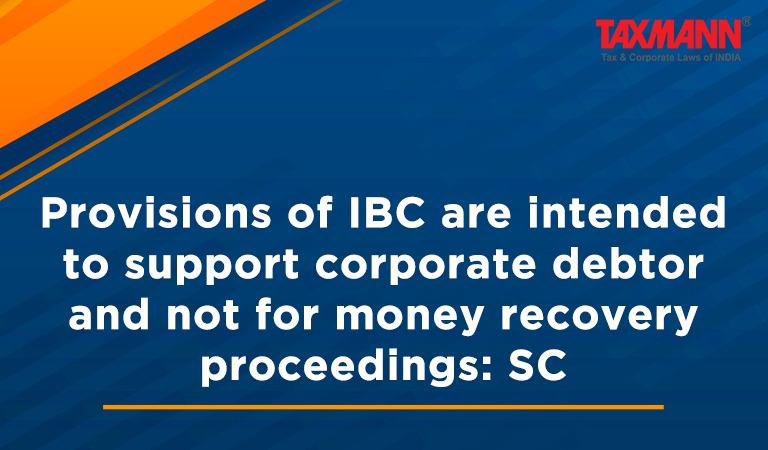Provisions of IBC are intended to support corporate debtor and not for money recovery proceedings: SC
- Blog|News|Insolvency and Bankruptcy Code|
- 2 Min Read
- By Taxmann
- |
- Last Updated on 30 April, 2022

Case Details: Invent Asset Securitisation and Reconstruction (P.) Ltd. v. Girnar Fibres Ltd. - [2022] 137 taxmann.com 462 (SC)
Judiciary and Counsel Details
-
- Dinesh Maheshwari and Aniruddha Bose, JJ.
- Harshvir Pratab Sharma, Sr. Adv. Anoop Prakash Awasthi, AOR and P. Singh, Adv. for the Appellant.
Facts of the Case
In the instant case, an application was moved before the Hon’ble Supreme Court against the order of the Hon’ble National Company Law Appellate Tribunal, Delhi Bench. An application was filed by the appellant under section 7 of the Insolvency and Bankruptcy Code, 2016 against the corporate debtor.
The corporate debtor defaulted on 28-02-2002. The applicant filed an application before the Hon’ble National Company Law Tribunal (NCLT). The NCLT held that right to sue accrued when the default occurred way back on 28-2-2002, and that the material on record does not evidence any acknowledgment of liability in terms of Section 18 of the Limitation Act, 1963. Therefore, the debt has become time-barred now. No insolvency proceedings can be initiated against the corporate debtor.
The applicant filed an appeal before the Hon’ble National Company Law Appellate Tribunal against the order of the NCLT. NCLAT took the same view as that of the NCLT.
Supreme Court Held
On further appeal, the Supreme Court dismissed the plea and held that both NCLT & NCLAT have rightly taken the view that the application as moved by the present appellant under Section 7 of the Insolvency and Bankruptcy Code, 2016 (‘the Code’) was barred by limitation.
Although the counsel for the appellant has attempted to refer to the documents towards restructuring of the loan and the alleged revival letter etc. Court is satisfied that the said documents cannot enure to the benefit of the appellant so far as the application under Section 7 of the Code is concerned.
The provisions of the Code are essentially intended to bring the corporate debtor to its feet and are not of money recovery proceedings as such. The intent of the appellant had only been to invoke the provisions of the Code so as to enforce recovery against the corporate debtor.
Disclaimer: The content/information published on the website is only for general information of the user and shall not be construed as legal advice. While the Taxmann has exercised reasonable efforts to ensure the veracity of information/content published, Taxmann shall be under no liability in any manner whatsoever for incorrect information, if any.

Taxmann Publications has a dedicated in-house Research & Editorial Team. This team consists of a team of Chartered Accountants, Company Secretaries, and Lawyers. This team works under the guidance and supervision of editor-in-chief Mr Rakesh Bhargava.
The Research and Editorial Team is responsible for developing reliable and accurate content for the readers. The team follows the six-sigma approach to achieve the benchmark of zero error in its publications and research platforms. The team ensures that the following publication guidelines are thoroughly followed while developing the content:
- The statutory material is obtained only from the authorized and reliable sources
- All the latest developments in the judicial and legislative fields are covered
- Prepare the analytical write-ups on current, controversial, and important issues to help the readers to understand the concept and its implications
- Every content published by Taxmann is complete, accurate and lucid
- All evidence-based statements are supported with proper reference to Section, Circular No., Notification No. or citations
- The golden rules of grammar, style and consistency are thoroughly followed
- Font and size that’s easy to read and remain consistent across all imprint and digital publications are applied



 CA | CS | CMA
CA | CS | CMA
